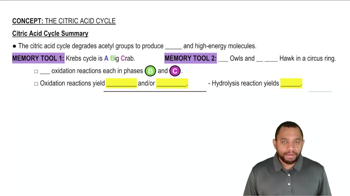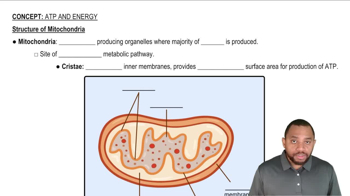Textbook Question
Name the metabolic substrate(s) that can be produced from the carbon atoms of each of the following amino acids:
c. valine
437
views

 Verified step by step guidance
Verified step by step guidance



Name the metabolic substrate(s) that can be produced from the carbon atoms of each of the following amino acids:
c. valine
Name the metabolic substrate(s) that can be produced from the carbon atoms of each of the following amino acids:
c. cysteine
Name the location in the cell where the following catabolic processes take place:
a. glycolysis
Name the location in the cell where the following catabolic processes take place:
c. β oxidation
Identify each pathway as anabolic or catabolic.
a. gluconeogenesis
Identify each pathway as anabolic or catabolic
b. citric acid cycle